This article was co-authored by Zora Degrandpre, ND. Dr. Zora Degrandpre is a Natural Health Doctor and Licensed Naturopathic Physician in Vancouver, Washington. She is a grant reviewer for the National Institutes of Health and the National Center for Complementary and Alternative Medicine. She received her ND from the National College of Natural Medicine in 2007.
There are 16 references cited in this article, which can be found at the bottom of the page.
wikiHow marks an article as reader-approved once it receives enough positive feedback. This article has 15 testimonials from our readers, earning it our reader-approved status.
This article has been viewed 674,114 times.
Whether you've lost weight or you're just naturally skinny, you may come to a point where you want to put on some weight. The best way to gain weight is to increase the calories in your diet naturally, as well as change some of your habits to push more eating in your lifestyle. However, it's best to see your doctor to find out what's causing your low body weight or to learn how to gain healthily during pregnancy.
Steps
Increasing Your Calories
-
1Eat protein to gain muscle. If your goal is to put on muscle mass, then you need to be eating protein-rich foods on a regular basis. It's especially good to eat protein after a workout. Lean meats (such as chicken, lean pork, and fish), eggs, beans, and lentils are all great sources of protein, as well as yogurt and nuts and healthy oils[1]
- Even something as simple as chocolate milk is a good way to get in your protein, although be mindful that most chocolate milks contain a lot of sugar, which isn't good for you in large quantities.[2]
- Also try to eat protein right before going to bed. Drink some milk or eat some yogurt to fuel you through the night. This may also help you recover if you work out frequently.[3]
- Stir in protein powder to your yogurt, oatmeal, and other foods to add a protein and calorie boost.[4]
-
2Add calorie-dense foods to your meals. Try adding full-fat cheese to the top of your meals. Stir some peanut butter and honey into your oatmeal. These foods are high in calories and can help you increase your overall caloric intake.[5]
- Another calorie-dense food is dried fruit, such as dried apricots, figs, or raisins.
- Eat complex carbohydrates, such as brown rice, bulgur, barley, whole grains, and quinoa. Avoid simple carbs like white flour, sugar and white rice.
Advertisement -
3Use milk powder to increase the calories in your recipes. Instant milk powder is a simple way to beef up dishes, from casseroles to soup. Simply stir in the powder while you're cooking. Wait for it to dissolve before you serve the dish.[6]
- Milk powder can make your dish creamier, though a tablespoon or 2 won't make much difference.
-
4Eat healthy oils and fats. Healthy oils, such as olive oil, avocado, and nuts (which have healthy fats in them), are rich in nutrients as well as high in calories. Adding a dash of oil to a salad or topping your meal with some sliced avocado is an easy way to increase calories.[7]
- For instance, if you're enjoying some mashed potatoes, stir in some olive oil to make them creamier. For a quick mid-afternoon snack, a handful of almonds or peanuts is a good option.
- Seeds such as sunflower and pumpkin seeds have a high level of calories and also contain "good" fats that raise your good cholesterol levels.[8]
- Use coconut oil sparingly. Although it does boost your "good" cholesterol levels, it is 90% saturated fat and too much of it could cause health issues. Other oils, such as olive oil and soybean oil, provide more health benefits.[9]
-
5Include treats in your diet more often. Though you want to keep your foods nutritionally dense, it's fine to include treats every now and then to help increase your calories. Have a brownie after dinner if you're craving chocolate. Just don't make sugar the bulk of your food.[10]
- You might consider having 1 treat daily.
-
6Eat comfort foods while you're sick. If you just don't feel like eating while you're sick, one of the best tricks is to pick foods that are comfort foods for you. That way, at least you are still getting enough calories to sustain yourself. It's important to try to incorporate fruits and vegetables as much as possible, but when nothing sounds good, pick something you normally enjoy.
- Bland foods such as mashed potatoes and macaroni and cheese can be good choices, since they're packed with calories but unlikely to upset your stomach when you're sick.
-
7Focus on nutrition after recovering from an illness. If you've been sick, you may have been eating only what sounds good. It's fine while you're sick, but now that you're getting better, you need to make sure you are getting all the vitamins and minerals you need.[11]
- Make sure to eat balanced meals with protein, whole grains, vegetables, and fruit. Fish is a great protein that is high in nutrients. Don't forget bright-colored vegetables, leafy greens, and also include dairy in your diet, as well.
Changing Your Habits
-
1Eat solid meals. Every day, make sure you get in at least three meals. Introduce larger portions at your meals to help increase your calories. You may have a tendency to skip breakfast, only eating 2 main meals, but making sure you actually eat three meals can help you gain weight.[12]
- If you can't eat huge meals because it upsets your stomach, eat smaller meals throughout the day. Don't skip meals.
-
2Eat regularly. Eating often throughout your day can provide you a steady flow of calories. Try to eat at least every 4 hours, whether it is one of your meals or a small snack. If you're not up to a meal, have a snack that includes protein and three different types of food. If you prefer, you can create 4-6 smaller meals throughout the day, rather than adding snacks between larger meals.
- For instance, try a piece of whole grain bread with banana and peanut butter or some celery with hummus and feta cheese.
-
3Keep calorie-dense snacks on hand. Prepare snacks ahead of time that are easy to grab and eat. If you have them on hand, you're more likely to eat when you should.
- For instance, you can mix dried fruit, chocolate chips (dark is best), rolled oats, and a nut butter. Make them into golf-ball size portions, and store them wrapped individually in parchment paper or wax paper.
- For quick snacks, keep trail mixes on hand, as the mix of nuts and dried fruit is calorie-dense.[13]
-
4Try drinking your calories. Sometimes, eating all day long can fill you up, and you don't get enough calories to gain weight. However, if you get some of your calories in liquid form, you won't feel as full.
- You want to skip sodas, which don't offer much nutrition. Instead, drink smoothies, liquid yogurt, and even fruit juice, all of which have calories and nutrients.
-
5
-
6Skip empty calories. While chips and cookies look like an easy way to put on weight, you want to put on weight healthily. Eating these empty calories isn't healthy. Keep your foods rich in nutrients, such as vegetables, fruits, and meat, as you increase your calories. Avoid foods such as sodas and overly sugary foods.[16]
- One reason you want to skip these calories is they won't help you build muscle or bone, which help support your added weight.[17]
-
7Exercise and lift weights. Lifting and weight training help your body gain muscle weight, which is the best kind of weight for your body to put on. Start off slowly if you aren't used to doing this kind of training. Increase weight and decrease reps as you go along[18]
- In addition, exercise increases your appetite, making you want to eat more.[19]
- A simple exercise to start with is bicep curls. Hold a weight in each hand. Your arms should be bent at the elbows so the weights are out in front of you. Lift the arms together to your shoulders, then slowly bring them back down. Repeat 6 to 8 times. Rest, and do it again.[20]
- You can also try exercises such as swimming, biking, or doing push-ups.
When to Seek Medical Care
-
1Visit your doctor to find out why you’re losing weight or can’t gain. It’s possible that you just have a high metabolism, so don’t worry. However, some medical conditions can cause you to lose weight or struggle to gain weight. Fortunately, your doctor can help you figure out what’s behind your low body weight so you can safely gain. For instance, the following conditions may cause weight loss:[21]
- Type 1 or type 2 diabetes
- Hyperactive thyroid, which is an overactive thyroid
- Celiac disease
- Anorexia nervosa
- Bulimia
- Stress
- Depression
- Certain medical treatments, like chemotherapy
-
2Check with your doctor if you’re pregnant. Although it’s healthy to gain weight during pregnancy, how much you need to gain will vary. Your doctor will help you understand how much weight you should gain during each trimester, as well as how much you need to gain overall. Then, they’ll give you advice on how to meet your weight goals.[22]
- If you’re underweight when you conceive, you’ll typically need to gain 28 to 40 lb (13 to 18 kg) during pregnancy.
- If you’re at a healthy weight for your height, you’ll usually gain 25 to 35 lb (11 to 16 kg).
- If you’re overweight, you may need to gain 15 to 25 lb (6.8 to 11.3 kg).
- If you’re considered obese, you might expect to gain 11 to 20 lb (5.0 to 9.1 kg).
-
3Work with your doctor to set a weight goal and create a healthy plan. It may be hard to determine if you need to gain weight, as well as how much. Your doctor can help you understand the best target weight for your body so you can set a goal for gaining weight. Then, they’ll help you identify a healthy dietary and exercise plan to meet your needs.[23]
- Don’t start a new diet or exercise plan without discussing it with your doctor. They can help you understand what’s safe for you to try.
- Exercise is important for your health, so you shouldn’t stop exercising to gain weight. Your doctor will help you figure out how to get at least 150 minutes of moderate exercise a week without halting your weight gain.
-
4Talk to your doctor about treatment options for an underlying condition. Dealing with a condition that affects your weight can be really frustrating, but there is hope. Your doctor can treat conditions like diabetes, hyperthyroidism, celiac disease, anorexia nervosa, and bulimia. Ask them which treatments may be right for you so that you can start gaining weight healthily.[24]
- For instance, you may take insulin or medication to stimulate your body’s use of insulin if you have diabetes.[25]
- If you have hyperthyroidism, your doctor may prescribe medication to shrink your thyroid. In rare cases, they might recommend a simple surgical procedure to remove part of your thyroid.[26]
- If you have celiac disease, your doctor will help you eliminate gluten from your diet. They may also recommend supplements to boost your nutrients or a medication to help reduce inflammation in your digestive system.
- If you have anorexia nervosa, bulimia, high stress, or depression, you may be able to work with a therapist to overcome your illness.
-
5Eat soft foods and follow your doctor’s advice to gain weight during chemo. Dealing with cancer is difficult, especially since you’re likely low on energy. While chemotherapy can help you fight cancer, it may also make you struggle to eat or keep food down. You may be able to eat more if you stick to soft foods, like soup or mashed potatoes. Puree solid foods like cooked veggies so they’re easier to keep down. Try adding milk and cheese to your meals to increase the nutrients while keeping the texture soft.[27]
- Your doctor may be able to give you additional tips.
- Everyone is different, so what works for someone else may not work for you. Try not to give up because there’s likely something that will work for you.
Help Gaining Weight
Expert Q&A
Did you know you can get expert answers for this article?
Unlock expert answers by supporting wikiHow
-
QuestionHow can I increase my muscle mass and gain weight that way?
 Zora Degrandpre, NDDr. Zora Degrandpre is a Natural Health Doctor and Licensed Naturopathic Physician in Vancouver, Washington. She is a grant reviewer for the National Institutes of Health and the National Center for Complementary and Alternative Medicine. She received her ND from the National College of Natural Medicine in 2007.
Zora Degrandpre, NDDr. Zora Degrandpre is a Natural Health Doctor and Licensed Naturopathic Physician in Vancouver, Washington. She is a grant reviewer for the National Institutes of Health and the National Center for Complementary and Alternative Medicine. She received her ND from the National College of Natural Medicine in 2007.
Natural Health Doctor Try the approaches listed here and increase your intake of high-quality lean protein a bit. Also, the best ways to increase muscle mass is by exercise — using weights and doing strength and resistance training are most efficient. Mix up the exercises every day and do these exercises 4 – 6 times a week.
Try the approaches listed here and increase your intake of high-quality lean protein a bit. Also, the best ways to increase muscle mass is by exercise — using weights and doing strength and resistance training are most efficient. Mix up the exercises every day and do these exercises 4 – 6 times a week. -
QuestionI am a 30+ woman and I am suffering from IBS (diarrhea prominent). I have lost a lot of weight. I am taking an Ayurvedic medication. How can I increase my weight?
 Zora Degrandpre, NDDr. Zora Degrandpre is a Natural Health Doctor and Licensed Naturopathic Physician in Vancouver, Washington. She is a grant reviewer for the National Institutes of Health and the National Center for Complementary and Alternative Medicine. She received her ND from the National College of Natural Medicine in 2007.
Zora Degrandpre, NDDr. Zora Degrandpre is a Natural Health Doctor and Licensed Naturopathic Physician in Vancouver, Washington. She is a grant reviewer for the National Institutes of Health and the National Center for Complementary and Alternative Medicine. She received her ND from the National College of Natural Medicine in 2007.
Natural Health Doctor You can try increasing the amount of fiber in your diet by choosing whole grains — these are digested more slowly. Keep a diet diary to see if some foods make your IBS-D worse. You should also try and make certain to avoid any foods with sugar in them and depend more on the complex carbohydrates (in whole grains) and healthy fats to try and gain weight. Find a nutritionist that can work with you to find the best foods for you.
You can try increasing the amount of fiber in your diet by choosing whole grains — these are digested more slowly. Keep a diet diary to see if some foods make your IBS-D worse. You should also try and make certain to avoid any foods with sugar in them and depend more on the complex carbohydrates (in whole grains) and healthy fats to try and gain weight. Find a nutritionist that can work with you to find the best foods for you.
Warnings
- Always ask your doctor before trying to gain weight. They can help you do it safely.[28]⧼thumbs_response⧽
References
- ↑ http://www.bbcgoodfood.com/howto/guide/best-sources-protein
- ↑ http://www.webmd.com/diet/how-to-gain-weight?page=2
- ↑ http://www.ncbi.nlm.nih.gov/pubmed/22330017
- ↑ http://www.uccs.edu/Documents/healthcircle/pnc/health-topics/Weight%20Gain.pdf
- ↑ https://www.betterhealth.vic.gov.au/health/healthyliving/weight-and-muscle-gain
- ↑ https://www.betterhealth.vic.gov.au/health/healthyliving/weight-and-muscle-gain
- ↑ https://www.betterhealth.vic.gov.au/health/healthyliving/weight-and-muscle-gain
- ↑ http://www.uccs.edu/Documents/healthcircle/pnc/health-topics/Weight%20Gain.pdf
- ↑ http://www.health.harvard.edu/staying-healthy/coconut-oil
- ↑ http://www.mayoclinic.org/healthy-lifestyle/nutrition-and-healthy-eating/expert-answers/underweight/faq-20058429
- ↑ http://www.mayoclinic.org/healthy-lifestyle/nutrition-and-healthy-eating/expert-answers/underweight/faq-20058429
- ↑ https://www.betterhealth.vic.gov.au/health/healthyliving/weight-and-muscle-gain
- ↑ http://www.webmd.com/diet/how-to-gain-weight?page=3
- ↑ http://www.mayoclinic.org/healthy-lifestyle/nutrition-and-healthy-eating/expert-answers/underweight/faq-20058429
- ↑ http://www.mayoclinic.org/healthy-lifestyle/nutrition-and-healthy-eating/expert-answers/underweight/faq-20058429
- ↑ https://www.betterhealth.vic.gov.au/health/healthyliving/weight-and-muscle-gain
- ↑ https://www.betterhealth.vic.gov.au/health/healthyliving/weight-and-muscle-gain
- ↑ http://www.mayoclinic.org/healthy-lifestyle/nutrition-and-healthy-eating/expert-answers/underweight/faq-20058429
- ↑ http://www.mayoclinic.org/healthy-lifestyle/nutrition-and-healthy-eating/expert-answers/underweight/faq-20058429
- ↑ http://www.bodybuilding.com/exercises/detail/view/name/dumbbell-bicep-curl
- ↑ http://www.nhs.uk/chq/pages/2302.aspx?categoryid=51&
- ↑ https://www.mayoclinic.org/healthy-lifestyle/pregnancy-week-by-week/in-depth/pregnancy-weight-gain/art-20044360
- ↑ https://www.mayoclinic.org/healthy-lifestyle/nutrition-and-healthy-eating/expert-answers/underweight/faq-20058429
- ↑ https://familydoctor.org/healthy-ways-to-gain-weight-if-youre-underweight/
- ↑ https://www.niddk.nih.gov/health-information/diabetes/overview/insulin-medicines-treatments
- ↑ https://www.mayoclinic.org/diseases-conditions/hyperthyroidism/diagnosis-treatment/drc-20373665
- ↑ https://www.cancerresearchuk.org/about-cancer/coping/physically/diet-problems/managing/putting-on-weight/adding-calories-to-soft-diet
- ↑ http://www.nhs.uk/chq/pages/2302.aspx?categoryid=51&
About This Article
To gain weight naturally, start by increasing your portion sizes for each meal or eating extra meals throughout the day to boost your calorie intake. You can also do this by adding calorie-dense foods, like full-fat cheese, raisins, or peanut butter to your meals. Another easy way to gain a lot of calories is through liquids like smoothies, fruit juice, and liquid yoghurt. If you want to build muscle mass, eat lots of protein, like chicken, pork, eggs, and beans. Between meals, snack on healthy foods like dried fruits and nuts. If you’re worried about not being able to gain weight, visit your doctor for advice. For more tips from our Medical co-author, including how to gain weight through exercise, read on!
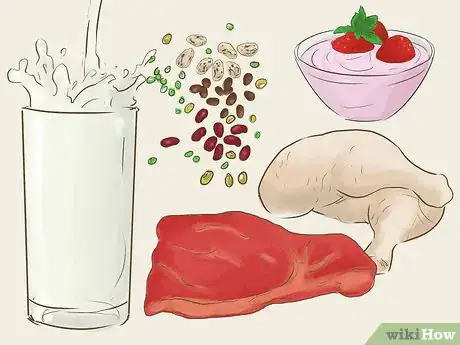
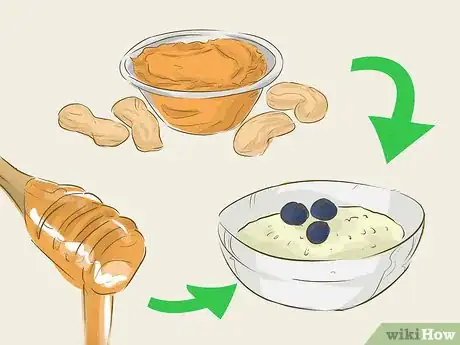
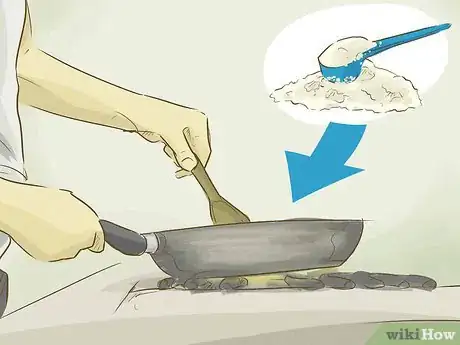
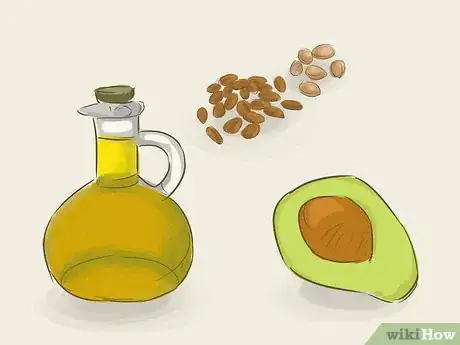
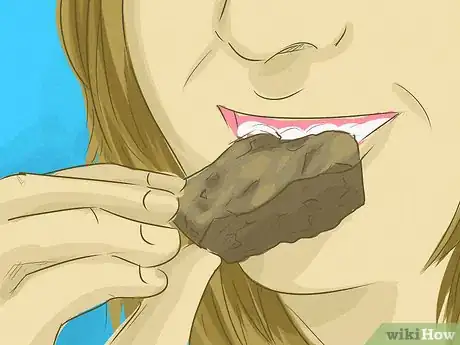

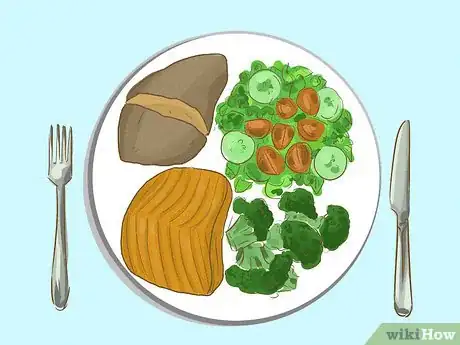
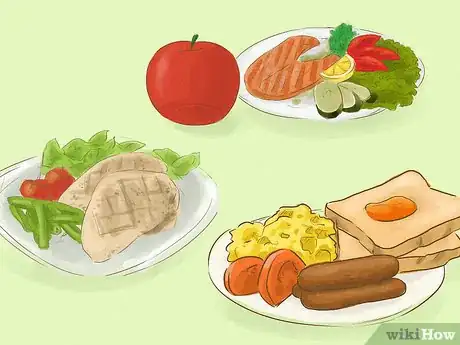
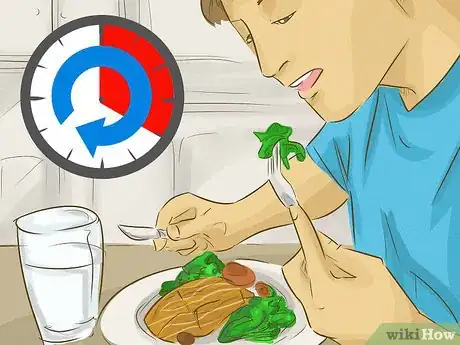
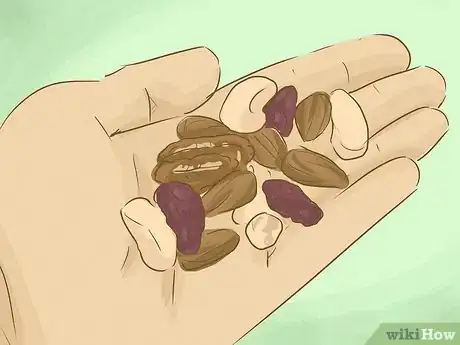


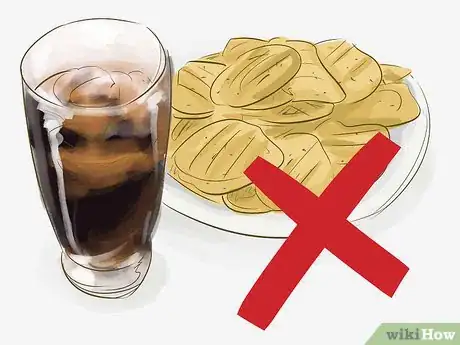

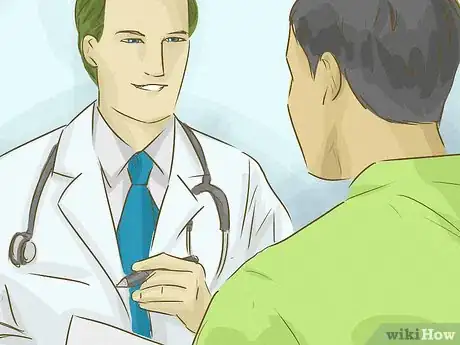
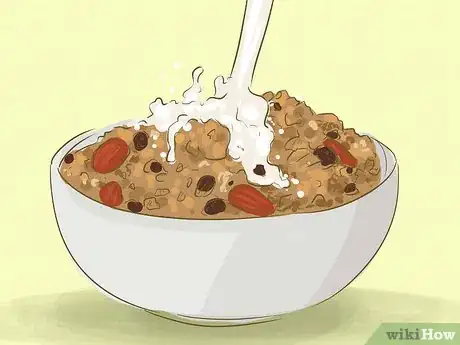
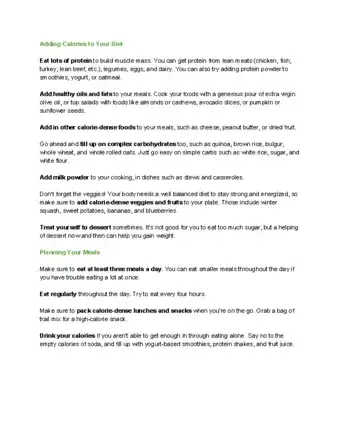
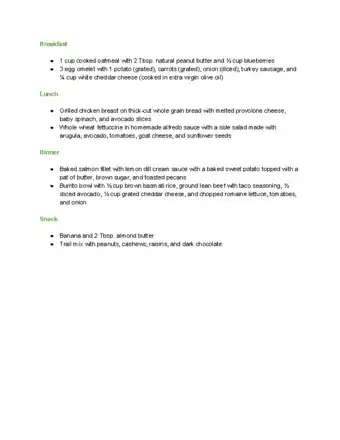



-Step-16-Version-2.webp)
-Step-14.webp)



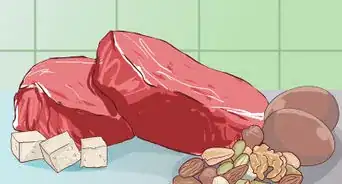

















-Step-16-Version-2.webp)
-Step-14.webp)



































Medical Disclaimer
The content of this article is not intended to be a substitute for professional medical advice, examination, diagnosis, or treatment. You should always contact your doctor or other qualified healthcare professional before starting, changing, or stopping any kind of health treatment.
Read More...